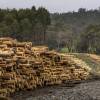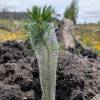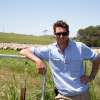
Winton Farm set to enjoy the environmental benefits of trees
Posted 19 July 2023
Plantation Planning Managing trees On-farm benefits Economic benefits and markets Native regrowth forest management Tree Alliance
John Taylor is a seventh-generation farmer living on Winton Estate, a 3,3000-ha farm just 15km North West of Campbell Town.
John returned from Agriculture College at the end of 2000 to live and work on the Taylor family farm which has been owned and operated by the family since 1832.
The Taylor family now run a variety of enterprises on the farm including hemp, wheat, barley, beef cattle and merino sheep.
After planting native trees along the creek bed on Winton Estate, John says he has seen first-hand the added benefits of planting trees on the farm.
“I’ve been wanting to plant radiata pines on the farm for a while now as they grow well in this dry, sandy environment which doesn’t get a lot of rainfall. We also get a lot of frost so pine trees would be the best performer in an area like this”, explains John.
After learning about the positive impacts of planting trees on farms, John says he really wanted to get involved in the initiative with Private Forests Tasmania.

Trees for irrigation
As Winton Farm has a high water table, John says that strategically planting trees will help to reduce the water levels whilst improving water efficiency for irrigation purposes.
“The native trees we planted along the creek bed have led to massive improvements in water quality and has helped combat some of the water erosion. We could also see a noticeable reduction in the salinity of our soils which makes us very keen to plant more trees,” explains John.
John says that one of the added benefits of planting trees, that he is excited to see, is the effects they will have on his livestock’s health and production. Trees provide protection from sun, wind and rain, and help to increase the general health and population of the livestock.
“Growing the radiata pines strategically along the fence lines of the property will provide shelter for our livestock by reducing the impacts of the strong winds we can get here,” explains John.
“The trees will also provide protection to our new seedlings, crops and growing hemp production, so this is something that will really improve our crop survival rate.”
Planting for the future
“Being involved in the demonstration site project is financially a long-term investment that will appreciate when we can harvest the trees and sell the timber in say 30 years’ time”, says John.
John also notes that the positive environmental impacts of planting trees also influenced his decision to participate in the demonstration site project.
“Another reason we are excited to get involved in this initiative is to help benefit the environment. Planting these trees will help to reduce our carbon footprint and improve the carbon balance, which we are really happy about”, says John.
After already seeing the benefits of having trees strategically planted on Winton Estate, John says he would highly recommend other farmers look to tree planting as an environmentally friendly solution to the issues caused by wind and high-water levels.
Species: Pinus Radiata
Total area planted: 41.5ha
Seed source: STBA Level 7
Total seedling numbers: 41,500
Share this Article
Latest Articles
-

03 February 2026
Considering outcomes of our Market Access project to enable greater market opportunities for private growers
-

28 January 2026
Storing carbon in St Peters Pass woodlot
-

16 December 2025
What’s happening to the Environment Protection and Biodiversity Conservation (EPBC) Act and what could this mean for forestry in Tasmania?
Archives
- ActivAcre hits milestone, calls for more farmers to get on board
- Napier's leading the way in sustainable forestry and carbon-neutral farming
- Sound science needed to assess carbon impacts of timber harvesting
- Newly appointed TFFPN Board of Directors
- Graduate Certificate of Forestry Scholarship
- Forestry Australia Mentoring Program 2025
- Forest Industry Roundtable planning for the long term
- Eagle Management Constraint Period extended
- Successful private native forest management celebrated
- $15 million investment in new ship loader to boost Bell Bay's forestry exports
- Standing with Tasmania's forestry industry: buy local
- TFPA: Tasmanian Freight Equalisation Scheme needs a ground-up review
- AFCA Gala Dinner celebrates industry excellence
- Fire permits now required Statewide
- Forest leaders hone skills in sustainable native regrowth management
- Tasmanian forests and the carbon market: Barriers and opportunities
- What the 2024-25 Tasmanian Budget means for forestry
- Spring is the time for fuel reduction burning
- Primed for Growth: A situation analysis of the Tasmanian Forest and Wood Products Sector
- Audit requirements cut for low-risk plantation projects
- Guidance and support for landowners after damaging winds
- Forestry Australia welcomes further definition of active forest management
- Farm & Forest Mapper Tool highlighted at Rural Youth Tasmania's Young Farmer of the Year competition
- Senate Select Committee inquiry into the Tasmanian Freight Equalisation Scheme
- Timberlink announces new wood composite products brand
- Newly developed protocol a vital tool for safeguarding forestry industry
- Red Hot Tips: Fire management for Tassie farmers
- Bioenergy: Fuelling industries with trees
- Harvesting trees: What you need to know
- Shelterbelts: How are they contributing to farm systems?
- Infill plantings and remnant vegetation: Why biodiversity depends on a thriving understory
- Plantation planning: The key to a successful plantation
- Exciting interactive forestry knowledge hub launched
- $450,000 farm forestry grant recipients revealed


